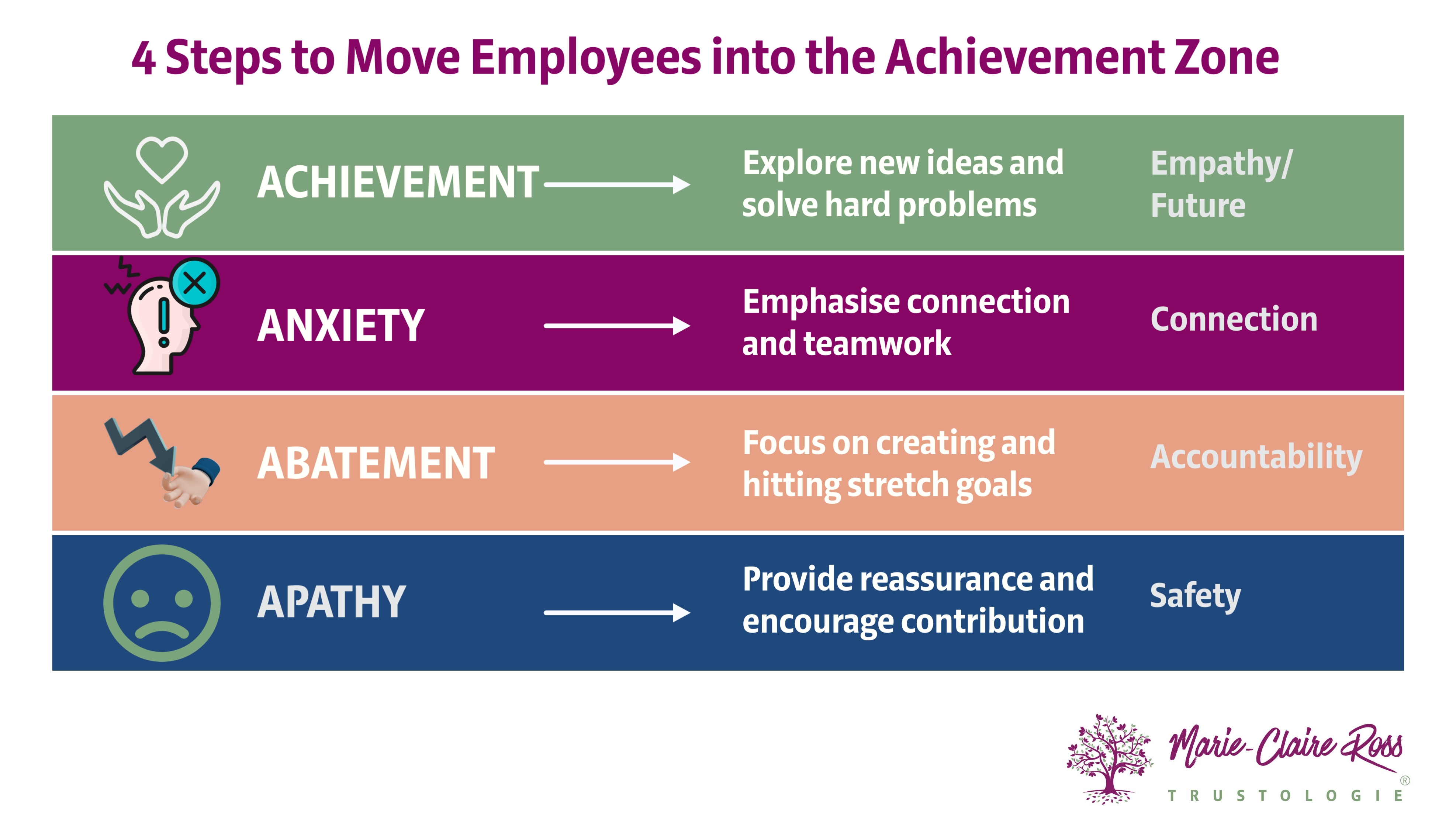11 min read
4 Practical Strategies for Better Emotional Management in the Workplace
I have a friend who often finds herself at the mercy of her emotions. Recently, she called me to rehash a confrontation she’d had with a group of...
Develop leaders, strengthen executive teams and gain deep insights with assessments designed to accelerate trust and performance.

Transform how your leaders think and perform with keynotes that spark connection, trust and high-performance cultures.

Explore practical tools, thought-leadership and resources to help you build trusted, high-performing teams.

Trustologie® is a leadership development consultancy founded by Marie-Claire Ross, specialising in helping executives and managers build high-trust, high-performing teams.

5 min read
Marie-Claire Ross : Updated on July 13, 2022

One of the common attributes of companies that have high performance workplace cultures is that they have a clear, well-specified purpose that states both how and why the company makes a positive impact to the world. It’s their fundamental reason for existence beyond just making money.
This is not a feel-good statement. It actually works towards pulling people forward especially in difficult times (and good). It helps people make better decisions and it generates tremendous energy that aligns everyone together towards a common cause.
The reason it is so powerful is because it’s the why – the emotional connection the business has to the world. Why the company exists. It’s an outside-in perspective, rather than the more common inside-out approach used by most organisations. Humans are emotional beings and they buy-in to their workplace based on how much the purpose resonates with their own values.
It also creates a high performance environment. According to Imperative’s research, purpose-oriented employees are 54% more likely to stay at a company for more than five years and 30% more likely to be high performers than those who work for a pay cheque. Employees who love their jobs are more productive, loyal and cost the company less over the long term.
Yet, most companies have a mission that does little to generate excitement or align a workforce to a compelling reason for being. They are often ambiguous and confusing. Without clarity of purpose, organisations waste enormous amounts of time and resources doing ‘busy work’ that leads to the wrong outcomes. Properly articulated, a clear purpose makes it much easier to create new strategies and improve the allocation of resources, budgets and time.
While these research findings might seem surprising to many, the reality is many of our top leaders have been inspiring their vast workforces with a noble purpose for decades.
Some of the worlds most revered and successful leaders have all been zealous in their pursuit of their company purpose, but also in ensuring employees share the same enthusiasm.
Mission-driven leaders help all employees and managers understand why their company exists. They boldly affirm what the company hopes to achieve and push toward the desired results.
Read any interview with Mark Zuckerberg, the CEO of Facebook and he will always refer to the mission. He credits Facebook’s achievement of expanding from 1,700 to 12,000 employees in five years, and still having a high performing culture, due to adhering to the mission. In a Fast Company interview Zuckerberg said:
“Facebook’s mission is to give everyone in the world the power to share, and to make the world more open and connected. Connecting the world is one of the fundamental challenges of our generation, so this is a long-term effort. As long as we stay focused on that mission, we’re going to keep attracting talented people who share the same goal and want to make it a reality.”
Another business leader who fervently follows the mission in everything she does is Oprah Winfrey. As the founder of the OWN network, she makes all her decisions through her purpose (in fact, her purpose is so famous even her followers refer to it as the”Church of Oprah”). All of her employees, especially her two top executives, are entrenched in the mission. The result is passionate employees who make decisions with the highly effective question: “What would Oprah do?”
As Oprah says,
“There’s a beautiful sifting and sorting process that happens with people who’ve been around the mission for a really long time.”
Nike is also extremely focused on their mission statement – “To bring inspiration and innovation to every athlete in the world.” In fact, so ingrained is their mission that executives will unabashedly work the corporate mission statement into regular conversation. According to an interview in Fortune magazine, “The effect is something like actors in a musical suddenly breaking out into song: You know you’re witnessing a rehearsed performance, but it’s an effective one”.
Mission-driven leadership comes from the heart. It requires talent and confidence. Mission-driven leaders teach managers how to align daily operations with the company’s purpose, and they encourage understanding and passion for that mission among all employees.
So why is purpose-driven leadership so effective? If you talk to HR directors and business leaders, they will often talk about how they recruit and align based on their values. While this is important, it’s not enough on its own. Values focus more on how things are done, while the purpose is why they are done. All the top companies in the world with high performance cultures, such as Facebook, Nike, LinkedIn and Apple all recruit based on people’s alignment to both the purpose and the values (ethical behaviours for business success).
Here are five reasons a purpose-driven culture is so critical to organisations:
1. Improves corporate confidence – Organisations that are purpose-driven are more likely to be optimistic and confident about the future. According to the Culture of Purpose Study by Deloitte, eighty-two percent of both executives and employees who worked for organisations with a strong sense of purpose say they are confident that their organisation will grow this year, compared to 48 percent of those in companies without a strong sense of purpose.
2. Increases trust – The secret to high performance organisations is that they are high in trust – both internally and externally. And the central pillar for building trust is a corporate purpose that’s defined by a genuine commitment to the social good. A socially relevant purpose that’s defined, communicated and embedded throughout the organisation provides employees with the context they need to understand how their work makes a difference to the world. And it makes a lot of sense. After all, we’re more likely to trust a company that they’re ethical, if we can see proof that they’re visibly making a difference to the world and not just paying lip service to it. In fact, high trust companies are more than 2.5 times likely to be high performing organisations in revenue growth than low-performing, according to Interaction Associates. While a Deloitte study found that 81% of respondents working for organisations with a strong sense of purpose say their stakeholders trust their leadership team versus 54% for their counterparts.
3. Increases innovation – According to PwC, a higher degree of trust in management is the characteristic that most clearly defines innovative companies. This reflects the fact that higher trust companies tend to foster a creative culture that supports innovation, which in turn boost competitiveness. Companies that are clear on how they provide societal benefits create a trustworthy environment that is critical to developing and bringing new products and services to market. A culture of trust, removes the controls and allows people to the freedom to innovate and contribute. According to a Deloitte survey, 80% of respondents from companies that have a strong sense of purpose say that their organisation encourage employees to innovate versus 35% of those in companies without a strong sense of purpose.
4. Amplifies your talent attraction ability – Having a compelling sense of purpose is becoming more important for winning the best talent. According to Deloitte’s Millennial Survey 2015, 60% of Millennial respondents reported that they chose to join their current employer in part because of the organisation’s “sense of purpose”. In addition, 57% of respondents who perceived their organisation to have a “strong sense of purpose” reported a “high level of employee satisfaction” at their company versus only 23% of those who worked at an organisation without a strong sense of purpose.
5. Improves Employee engagement – One of the striking findings from a survey by Deloitte was that 73 percent of employees who say they work at a “purpose-driven” company are engaged, compared to a tiny 23 percent of those who don’t.
It doesn’t matter how much positive impact your organisation does for the world, if you don’t communicate this to your employees. World class organisations understand the importance of actively involving employees to achieve business goals. While at the same time communicating how each individual’s contribution relates to the outcome. Organisations with established high-functioning workplace cultures are those who have an authentic and well-communicated purpose beyond recognition or profit.
As a further benefit, crafting a clear purpose that contains both the how and why enable executives and senior managers to collectively focus their employees through a shared understanding and acceptance of the mission. It’s much easier to communicate and direct behaviour, as well as guide strategic decision making when everyone is clear on the purpose.
Without an inspiring purpose, organisations tend to fall into the illusive trap of focusing on the bottom line with profits being more important than purpose.
Company leaders who fail to inspire their employees to rally behind their company’s purpose are sacrificing a golden opportunity to attract and retain top talent, improve stakeholder trust and confidence levels and to make it easier for employees to make business decisions that contribute to meeting the company’s long-term objectives.
That’s why all the great business leaders of our time from Steve Jobs, Bill Gates right through to Richard Branson have always been so maniacally focused on their purpose.

11 min read
I have a friend who often finds herself at the mercy of her emotions. Recently, she called me to rehash a confrontation she’d had with a group of...

9 min read
True leadership presence isn’t a performance or a set of charisma hacks; it is the felt experience of who you are being in the room. By cultivating...

13 min read
As teams return from their summer (or winter) break, you may notice subtle shifts in your team’s energy. Even if the end of year was positive, a new...

On a regular basis, I conduct roundtables with CEOs and executives about how many of their employees understand the company vision. A common theme...

When an organisation has experienced market success for a sustained duration, it is common for CEOs and some executive team members to assume the top...

Why is that successful and well-managed companies struggle with change and disruptive innovation? Too often, what got companies to where they are...